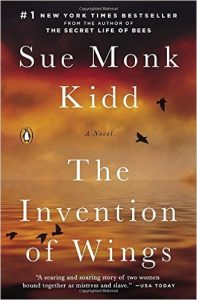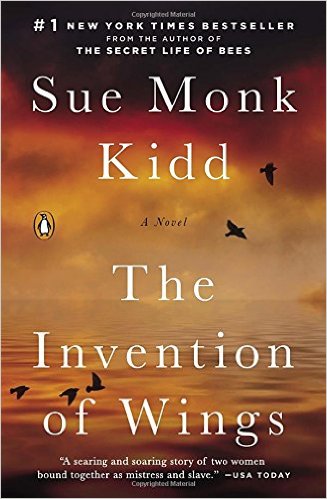THE INVENTION OF WINGS—EXPLORING THE SOUL OF A WOMAN WHO LEARNED TO FLY
Ever since The Invention of Wings by Sue Monk Kidd was released  in 2014, I’ve heard it described as the story of the relationship between a white girl and the enslaved black girl who is given to her as her personal maid on her eleventh birthday. The novel is that story, but its deeper story is the evolution of the white girl, Sarah Grimké, into not only a leader of the abolitionist movement but also one of the first proponents of women’s rights.
in 2014, I’ve heard it described as the story of the relationship between a white girl and the enslaved black girl who is given to her as her personal maid on her eleventh birthday. The novel is that story, but its deeper story is the evolution of the white girl, Sarah Grimké, into not only a leader of the abolitionist movement but also one of the first proponents of women’s rights.
Sarah Grimké was a real person who was born into Charleston aristocracy and grew up there in the years before the U.S. Civil War. Kidd used diaries, letters, newspaper accounts, and Sarah’s own writing as well as biographical material to learn the facts of Sarah’s life and many of her desires, struggles, and motivations. But the beauty of this novel comes from the rich inner life that Kidd imagines for Sarah, even as a child.
On the day that 10-year-old Hetty is given to her, Sarah refuses to accept the gift. When Hetty is forced on her, she uses her father’s book of South Carolina law to write a proper manumission document for Hetty and leaves it on her father’s desk. The next morning she finds the document outside her bedroom door, torn in two.
My first reaction to Sarah’s defiance was to think that a child born into a slave culture was unlikely to question it so strongly at such an early age. It just didn’t seem to me like something that would happen. Kidd sees the possibility, however, in the easy way we can dislike something as an idea while accepting the reality.
She creates a beautiful scene later in the novel in which Sarah discovers Hetty secretly bathing in the Grimké family’s copper bathtub. Sarah immediately sees the bath as an act of rebellion and usurpation, sure that Hetty has violated the intimacy of the tub and breached Sarah’s trust. When Hetty explains she didn’t see any harm in her being in the tub just like Sarah (and she calls her Sarah instead of Miss Sarah, a term she’ll never use again), Sarah understands that the act is not a rebellion but a declaration that Hetty was worthy of that privilege.
Kidd describes Sarah’s thinking:
“I saw then what I hadn’t seen before, that I was very good at despising slavery in the abstract, in the removed and anonymous masses, but in the concrete, intimate flesh of the girl beside me, I’d lost the ability to be repulsed by it. I’d grown comfortable with the particulars of evil.”
This realization makes sense to me, and it sets Sarah on her journey to become the remarkable woman she became.
Although Sarah isn’t allowed to legally free Hetty, she illegally teaches her to read, which she rightfully sees as a first step to freedom. During these years, she decides she want to be a lawyer like her father and brother. Her father playfully acknowledges the affinity she has for law until he realizes she’s serious about her ambition and of course squelches it because she’s a girl.
As a young adult, Sarah accompanies her ill father to be treated by doctors in Philadelphia. After he dies there, she remains for a while and begins attending Quaker meetings. She’s receptive to their ideas, including abolition. Eventually she has to return to South Carolina, but she can’t deny the pull of the community in Philadelphia. She thinks:
“How does one know the voice is God’s? I believed the voice bidding me to go north belonged to him, though perhaps what I really heard that day was my own impulse to freedom. Perhaps it was my own voice. Does it matter?”
Eventually Sarah sees that her true calling is not law and not Quaker ministry, which she considers briefly, but abolition. In her determination to abolish slavery, she speaks to women’s groups, an achievement that is extremely difficult for her, especially since she battles a speech impediment from childhood into adulthood. When her audiences begin to include men as well as women, she’s reprimanded by Quaker leaders for this unseemly activity, and the seeds of her demands for women’s rights are planted.
By focusing on Sarah, I don’t mean to take away from Kidd’s touching development of Sarah and Hetty’s friendship, her portrayal of Sarah’s sister Angelina, who was also a dedicated abolitionist, or her remarkable creation of Hetty’s character.
These aspects of the novel are all strong and satisfying, just not the main story.I also have to mention Kidd’s insightful way with words. To describe Hetty’s sister’s shoes she says, “The scrabble brown shoes, the scraped up sadness of them.” There’s a lot of living packed into those 10 words.
In creating Hetty, the only facts Kidd had to work with were that she was given to Sarah as a birthday present, the two of them became close, and against the laws of South Carolina, Sarah taught her to read. Her brief narrative stops there. But Kidd saw her as a fully developed human being, both as a child and as an adult. Kidd’s Hetty is smart, brave, and as defiant in her own way as Sarah.
It’s only fitting that the two of them conceive the novel’s triumphant ending.
Sally Whitney
Sally Whitney is the author of When Enemies Offend Thee and Surface and Shadow, available now from Pen-L Publishing, Amazon.com, and Barnesandnoble.com. When Enemies Offend Thee follows a sexual-assault victim who vows to get even on her own when her lack of evidence prevents police from charging the man who attacked her. Surface and Shadow is the story of a woman who risks her marriage and her husband’s career to find out what really happened in a wealthy man’s suspicious death.
Sally’s short stories have appeared in magazines and anthologies, including Best Short Stories from The Saturday Evening Post Great American Fiction Contest 2017, Main Street Rag, Kansas City Voices, Uncertain Promise, Voices from the Porch, New Lines from the Old Line State: An Anthology of Maryland Writers and Grow Old Along With Me—The Best Is Yet to Be, among others. The audio version of Grow Old Along With Me was a Grammy Award finalist in the Spoken Word or Nonmusical Album category. Sally’s stories have also been recognized as a finalist in The Ledge Fiction Competition and semi-finalists in the Syndicated Fiction Project and the Salem College National Literary Awards competition.
- Web |
- More Posts(67)
